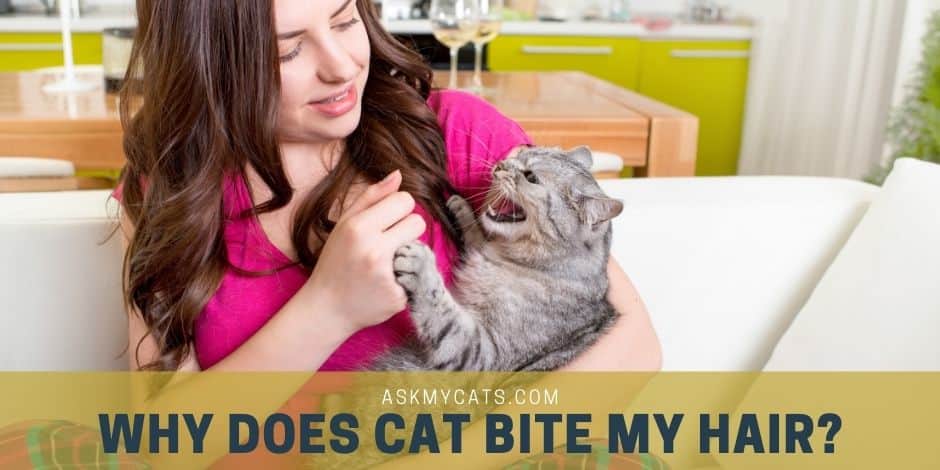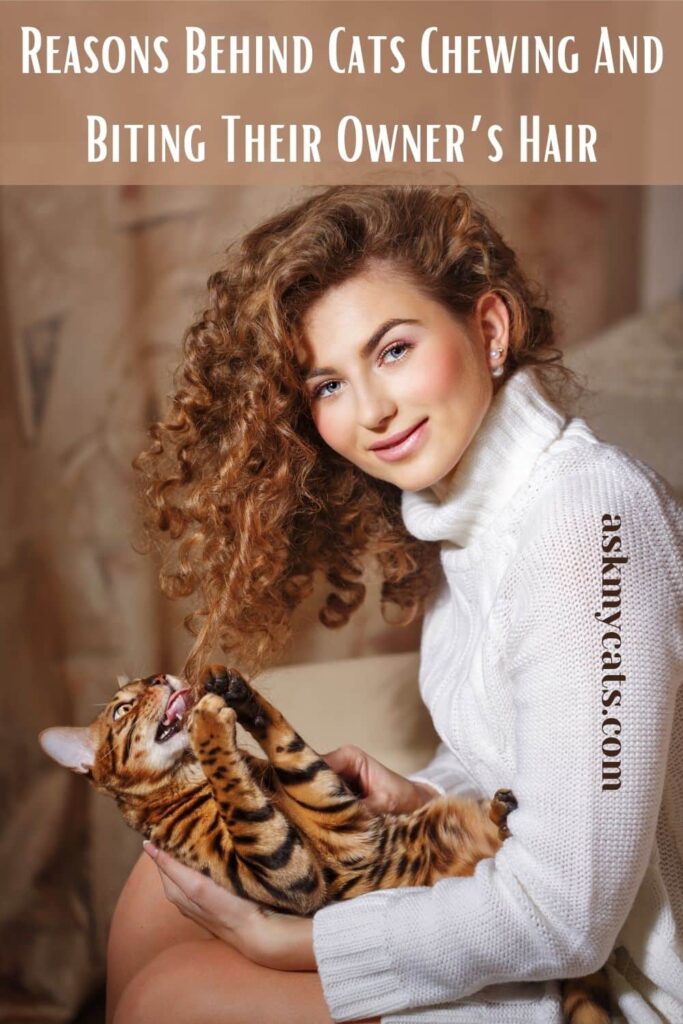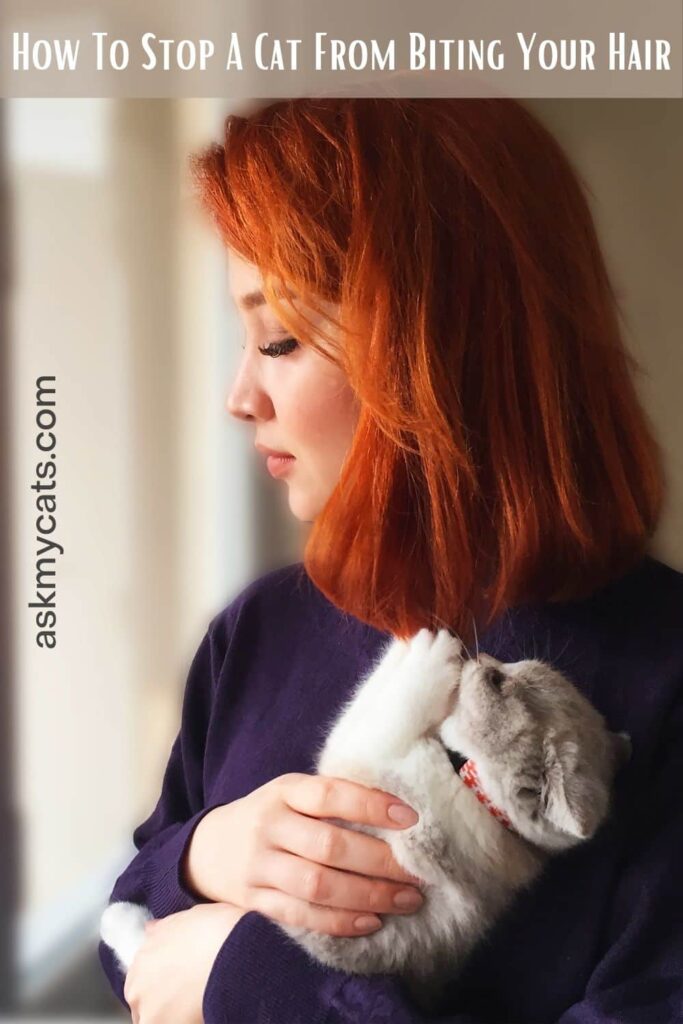Cats are intricate animals. In certain ways, their ambiguity gets a bad rap: they’re accused of being vain or lacking in love, but nothing could be farther from the facts. Cats are very affectionate, but they express their love in a variety of ways.
Your cat is fond of chewing your hair because to Express Affection. When cats brush each other, they kiss and nibble at each other to bond and express love.
Mutual grooming is a stress-relieving activity that allows cats to bond with one another and produce a shared smell. Since your kitty considers you to be a member of her social circle, she will treat you similarly.
Although dogs like to express their delight by wagging their tails, slobbering you with kisses, and knocking you over when you get home, cats like to take it in stride.
However, if you’ve earned their confidence, they’ll snuggle up next to you in bed while you’re watching TV or working on your tablet, turn over to show you their tum, and even chew on your fur!
Yes, the cat chewing on your hair is an expression of love.


Give Your Cat the Perfect Day
Get the Free Ebook!
Reasons Behind Cats Chewing And Biting Their Owner’s Hair

1. Reciprocate Love
Grooming, also known as allogrooming, is a way for cats to express love and bond.
Cats do this to the necks and heads of their grooming friends all the time, so it’s likely that their human companion is the same.
Grooming a cat can be really relaxing and stress-relieving.
2. Relaxation and Stress Reduction
If your cat is nervous, afraid, or depressed, chewing your hair might be a way for her to feel reassured of the connection you share, which may make her feel better.
You will relax and enjoy the affection if this gesture does not disturb you and is done in moderation.
If it continues or becomes more regular, consider any condition that might be stressing your cat, such as a new family member, a recent relocation, or the loss of another pet.
3. Chewing Compulsively
Is your cat’s habit of chewing on his own fur becoming more serious and frequent? He may have been a compulsive chewer as a result.
If you can’t lure the cat with a more appealing proposition, something has happened, and you will need to get the advice of a veterinarian or a pet therapist.
This expert will assist you in identifying potential chewing stimuli, as well as determining if the cause has already evolved into a trait that your cat requires.
The person should also be able to advise you about how to guide your cat’s reaction in a more positive direction.
4. Underlying Diseases
Hyperthyroidism is a condition that affects the thyroid gland.
The abrupt occurrence of human hair chewing is one of the signs of hyperthyroidism in cats (an overactive thyroid gland).
This disease is more prevalent in older cats, particularly those between the ages of 12 and 13.
Have an appointment with your doctor if your senior cat is showing this activity, as well as unexpected weight loss and a voracious appetite.
5. Pleasurable Experience For The Cat
Hair-biting aggression isn’t really motivated by a malicious emotion; often a stable cat just enjoys the action. A happy cat will experience a flush of feel-good endorphins and will want to keep doing so.
Your pet could even be showering you with love in the same manner as they express affection for each other by brushing each other.
Your cat might actually be loving the scent and/or taste of your newly groomed locks if you’ve just bathed or washed your hair.
6. The Flavour Appeals To The Cat
It may come as a shock, but your cat may simply enjoy the flavour of a hair product you’re using.
Heavy or citrus-like scents are not normally attractive to cats, but maybe you are using one with a milder smell that they enjoy.
Make sure you appreciate their love, or else they will start ducking while you try to pet them!
7. Suffering From Pica
Pica is a disease caused by nutritional malnutrition in cats that leads them to chew on non-food items such as fur.
Since they suffer from an illness known as pica, some cats like eating non-food things such as fur or fabrics.
WebMD warns that pica may be caused by a dietary deficit or even a medical condition like diabetes or feline leukaemia.
When cats are tired or don’t get enough exercise, they can channel their energy into chewing on your fur.
According to the American Society for the Prevention of Cruelty to Animals, early weaning will also lead to pica later in life.
Oriental species, such as the Siamese, have a higher genetic risk of developing pica than other breeds.
8. Miscellaneous
Have you recently acquired a kitten that is still very young? It’s possible that the hair chewing is a reaction to being removed from its mother too soon.
Many cat behaviourists believe that a kitten taken from its mother before the age of eight to ten weeks may bite, chew, and lick more than a kitten who has been properly weaned.
In addition, kittens, like puppies and infants, prefer to discover their new environment by taste.
Hair biting can be breed-specific in some cases. Burmese, Tonkinese, and Siamese (to name a few) are Asian breeds that enjoy biting and chewing cloth, paper, toys, and, yes, even your fur.
How To Stop A Cat From Biting Your Hair
Kick back and enjoy your grooming session if your cat’s hair chewing isn’t scratching your strands or causing you any pain. To repay the favour, stroke your cat on the head and ears.
If your feline companion begins to bite your fur, just get up and sit in a different place. She’ll eventually realise that chewing your hair isn’t going to get her much love or time with you.
You may even divert her focus to something else.

If your cat grooms your head, it is most definitely doing so as a form of social behaviour.
When cats like each other and have social relationships, they groom other cats in their family circle.
Since licking spreads perfume, cats that sleep together and brush each other have a similar odour. This produces a kind of family perfume that helps people see each other as healthy and welcoming.
If the cat starts purring out of nowhere, it’s possible she enjoys the scent of your new shampoo.
Your cats aren’t interested in making proper feline hairdos while grooming you.
Cats that attack an owner’s hair are most likely to be triggered by the human’s fur and wish to share the family smell of good grooming.
It’s possible that the cat will be rewarded in some way for repeating the action. Do you converse with the cat and pet it while brushing it?
If your cat taps your head, it might be enough to merely answer by moving back into range if you walk away.
When overdone, the action may become aggravating. Some cats tear out or chew off their owners’ feathers, just as they over-groom themselves when stressed.
The pulling/chewing behaviour may be a continuation of the wool-sucking behaviour that Oriental heritage cats are known for.
This may be due to dietary deficiencies (sometimes anaemia), as well as the risk of hairballs if they eat long strands of human hair. It’s a smart idea to take your pet to the doctor for a check-up if he or she appears to try to steal your feathers.
To avoid being snatched bald, give kitty a replacement, such as a fluffy plush toy, and shoo the cat away from your head.
In most situations, however, consider a cat brushing a human’s fur to be a major complement and a sign of love, similar to a petting session with cats.
Don’t worry, the cat won’t want you to transform into kitty beauticians with a promise and a kiss. Petting would suffice.
He may care for you so much that he can meow when you sneeze!
Frequently Asked Questions
Why does my cat bite and pull my hair?
When cats brush each other, they kiss and nibble at each other to bond and express love. Mutual grooming is a stress-relieving activity that allows cats to bond with one another and produce a shared smell. Since your kitty considers you to be a member of her social circle, she will treat you similarly.
Why does my cat chew on my hair?
Some cats tear out or chew off their owners’ feathers, just as they over-groom themselves when stressed. In most situations, however, consider a cat brushing a human’s fur to be a major complement and a sign of love, similar to a petting session with cats.
Why does my cat bite my hair when I’m sleeping?
It isn’t really unethical behaviour; they are attempting to groom you. It’s just not something that humans like. Cats not only spit in your fur, but they also pinch your scalp or use their teeth to keep your head still. Then the hair chewing begins, followed by scalp scraping and claws.
What does it mean when your cat bites your head?
For cats, biting the head may be a result of anxiety or stress. Some think it has something to do with a stress-relieving behaviour. This behaviour may be its way of reassuring itself of the connection you share, which helps to alleviate its fear. Cat stress can be caused by a variety of factors.
How do I get my cat to stop eating my hair?
Giving your cat something else to chew on, such as toys, food, cat grass, or even a bit of rawhide, is one of the better ways to get it to stop chewing on your fur. Physical activity and emotional relaxation, which it can get by spending more time with you, are both free distractions.
Final Words
If you find any other unusual habits in your cat, such as dragging clothes into litterbox or hair biting that has become more regular and painful, schedule an appointment with your veterinarian to have your pet thoroughly examined.
It’s best to know and follow through (if necessary) on your veterinarian’s recommendations, if it turns out to be nothing or anything.
Also, don’t forget to share our article if you like it and leave a comment down below regarding your suggestions.
